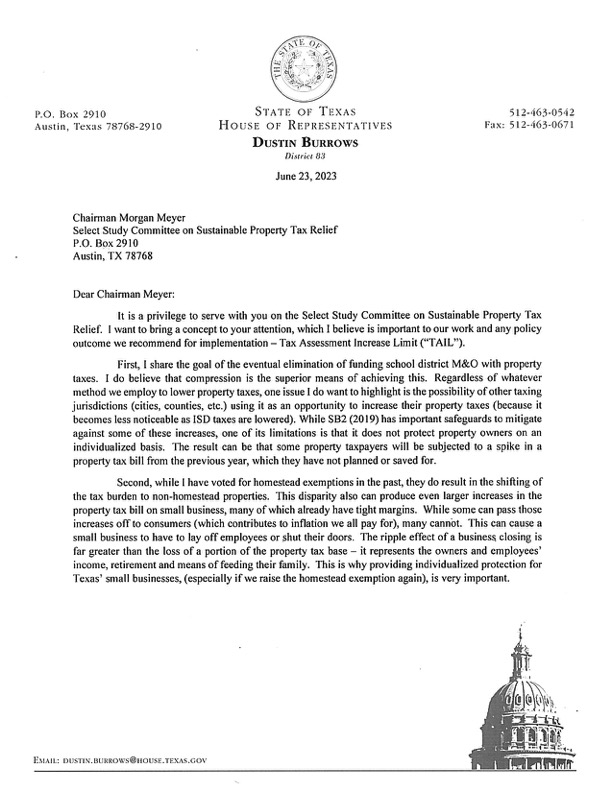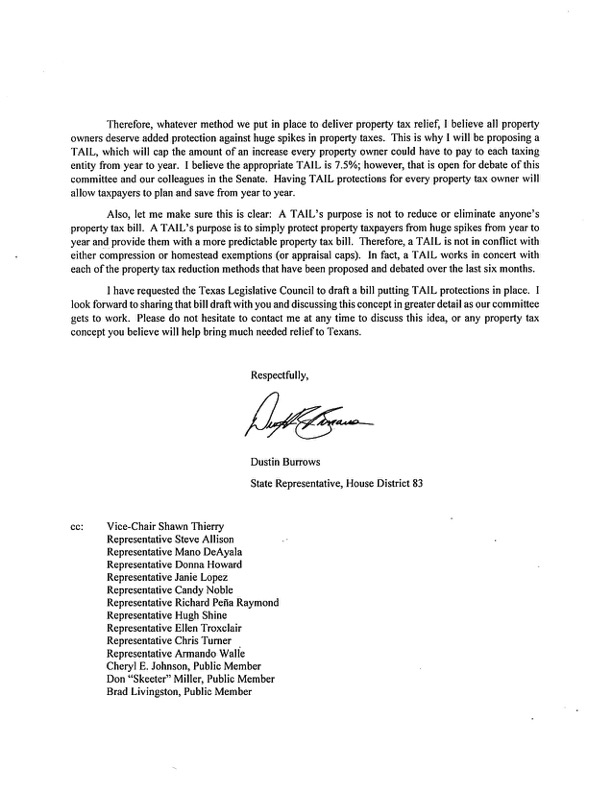Just three days after House Speaker Dade Phelan (R-Beaumont) formed a new Select Study Committee on Sustainable Property Tax Relief in the Texas House, Chairman Dustin Burrows (R-Lubbock) sent a letter to the committee’s chairman, Morgan Meyer (R-Dallas), proposing a new plan known as a “Tax Assessment Increase Limit” (TAIL), which would place a cap on individual property tax bill increases.
Chairman Burrows’ plan came more than three weeks into the first called special session and after several weeks of deadlock between the House and Senate over the best approach to provide new property tax relief to Texans.
The Senate’s plan (Senate Bill 26) combines some school M&O compression, a raise of the homestead exemption, and a franchise tax exemption. The House’s plan sends all relief money to M&O compression. (A plan comprised solely of school maintenance & operations tax compression, like the House plan, is favored by Texans for Fiscal Responsibility because it is the quickest path to M&O property tax elimination.)
In the letter to Chairman Meyer, Burrows proposes a TAIL of 7.5% on all individual property tax bills. This would mean that one’s property tax bill could increase more than 7.5% year over year to any given taxing entity (such as schools, cities and counties). Burrows says the exact percentage of the cap would be “open for debate.”


Burrows, who is himself a member of the select study committee, raised the concern that in the event the Legislature passes any significant amount of school M&O tax compression, other taxing entities, (such as cities, special purpose districts, and counties) would use the opportunity to raise taxes because the increases from other entities would become “less noticeable as ISD taxes are lowered.”
Burrows makes it clear that a TAIL would not “reduce or eliminate anyone’s property tax bill,” but rather it is meant to “simply protect property taxpayers from huge spikes from year to year and provide them with a more predictable property tax bill.”
While Chairman Burrows’ proposal seems beneficial—and it may be better than nothing, at the end of the day—there are problems. It must be noted that, even with a TAIL as low as 7.5%, an individual tax bill would still nearly DOUBLE in a decade. Texas taxpayers cannot afford that and would continue to be slowly crushed.
What no one wants to talk about is that one of the biggest problems affecting this whole conversation is government spending; the more money they spend, the more money they must take out of taxpayers’ wallets. If we truly want to rein in property taxes (and taxes in general), we must stop the exponential growth of government spending at all levels.
Perhaps instead of a TAIL to protect taxpayers from counties and cities from raising taxes, we should impose real spending limits on these entities? At a bare minimum, local taxing authorities should be limited to spending increases based on population plus inflation, and any excess funds should be used to buy down property taxes.
If we are truly serious about ending property taxes in Texas once and for all, this is the route we should take.
Texans for Fiscal Responsibility relies on the support of private donors across the Lone Star State in order to promote fiscal responsibility and pro-taxpayer government in Texas. Please consider supporting our efforts! Thank you!
Get The Fiscal Note, our free weekly roll-up on all the current events that could impact your wallet. Subscribe today!




